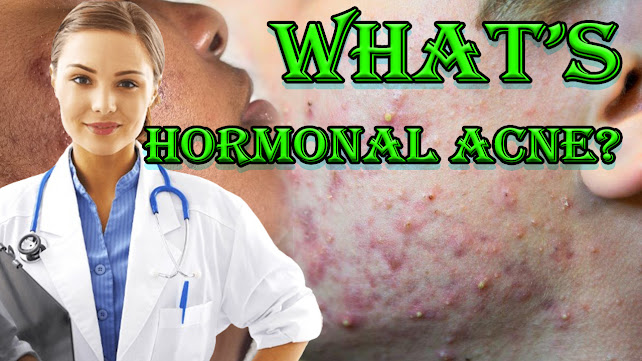You can watch video on YouTube: https://www.youtube.com/channel/UCeDRlH_Gm9zYwpGD-jlytHA/videos
You can watch video on Page: https://web.facebook.com/healthtv85
1. Understanding Hormonal Acne:
Hormonal acne is a type of acne that is closely linked to fluctuations in your hormones. It commonly affects teenagers undergoing puberty but can also affect adults, particularly women. These hormonal changes can lead to the overproduction of sebum (oil) in the skin, clogging pores and creating an environment where acne-causing bacteria can thrive.
2. Causes of Hormonal Acne:
The primary cause of hormonal acne is hormonal fluctuations, especially involving androgens, which are male hormones present in both men and women. Androgens can increase the size and activity of sebaceous (oil) glands, leading to excess oil production. Key hormonal changes that can trigger acne include:
- Puberty: Hormonal surges during puberty can lead to increased oil production and clogged pores.
- Menstrual Cycle: Many women experience acne flare-ups around their menstrual cycle due to hormonal changes.
- Pregnancy: Hormonal fluctuations during pregnancy can trigger acne.
- Polycystic Ovary Syndrome (PCOS): This condition causes an imbalance in hormones, often leading to acne.
- Menopause: Hormonal changes during menopause can also cause acne.
3. Symptoms of Hormonal Acne:
Hormonal acne often appears in specific areas of the face and body. Common symptoms include:
- Deep, cystic pimples that are tender to the touch.
- Acne along the jawline, chin, and lower cheeks.
- Breakouts that coincide with your menstrual cycle.
- Persistent acne that doesn't respond well to traditional treatments.
4. How to Diagnose Hormonal Acne:
Diagnosing hormonal acne typically involves a combination of self-assessment and consultation with a dermatologist. Your doctor may review your medical history, conduct a physical examination, and possibly recommend blood tests to check hormone levels.
5. Treatment Options for Hormonal Acne:
Treating hormonal acne can be challenging, but several options are available:
- Topical Treatments: Over-the-counter and prescription creams containing ingredients like benzoyl peroxide, salicylic acid, or retinoids can help reduce inflammation and unclog pores.
- Oral Medications: Birth control pills or anti-androgen medications like spironolactone can help regulate hormones and reduce acne in women.
- Hormone Therapy: Hormone replacement therapy may be an option for women going through menopause.
- Lifestyle Changes: Eating a balanced diet, managing stress, and maintaining a regular skincare routine can help manage acne.
- Professional Treatments: Dermatological procedures like chemical peels, laser therapy, or light therapy may be recommended for severe cases.
6. Skincare Routine for Hormonal Acne:
A consistent and gentle skincare routine can help manage hormonal acne. Here are some tips:
- Cleanse: Use a gentle cleanser twice daily to remove excess oil and impurities.
- Exfoliate: Use a chemical exfoliant like salicylic acid to prevent clogged pores.
- Moisturize: Choose a non-comedogenic moisturizer to keep your skin hydrated without clogging pores.
- Spot Treatment: Apply spot treatments to active breakouts to reduce inflammation and promote healing.
- Sun Protection: Use a broad-spectrum sunscreen to protect your skin from harmful UV rays.
7. Diet and Hormonal Acne:
Diet can play a role in managing hormonal acne. Some tips include:
- Reduce Sugar Intake: High sugar levels can lead to insulin spikes, which can exacerbate acne.
- Limit Dairy Products: Some studies suggest a link between dairy consumption and acne.
- Eat a Balanced Diet: Focus on whole foods, including fruits, vegetables, lean proteins, and healthy fats.
8. Managing Stress:
Stress can worsen hormonal acne by triggering hormonal fluctuations. Incorporate stress management techniques such as meditation, yoga, exercise, or hobbies to keep stress levels in check.
9. When to See a Dermatologist:
If your acne is severe, painful, or affecting your self-esteem, it's essential to see a dermatologist. A dermatologist can provide personalized treatment plans and recommend advanced therapies that may not be available over the counter.
Conclusion:
Understanding and managing hormonal acne requires a combination of knowledge, self-care, and professional guidance. By recognizing the signs of hormonal acne and exploring the various treatment options, you can take proactive steps toward achieving clearer, healthier skin.
Thank you for watching! Don't forget to like, comment, and subscribe for more skincare tips and health information. Take control of your skin health and feel confident in your journey to clear skin. Stay informed and take care!

No comments:
Post a Comment